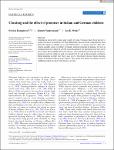Cheating and the effect of promises in Indian and German children
| dc.contributor.author | Kanngiesser, P | |
| dc.contributor.author | Sunderarajan, J | |
| dc.contributor.author | Woike, Jan Kristian | |
| dc.date.accessioned | 2023-10-17T10:57:56Z | |
| dc.date.available | 2023-10-17T10:57:56Z | |
| dc.date.issued | 2023-06-12 | |
| dc.identifier.issn | 1467-8624 | |
| dc.identifier.issn | 1467-8624 | |
| dc.identifier.uri | https://pearl.plymouth.ac.uk/handle/10026.1/21449 | |
| dc.description.abstract |
Cheating is harmful to others and society at large. Promises have been shown to increase honesty in children, but their effectiveness has not been compared between different cultural contexts. In a study (2019) with 7- to 12-year-olds (N = 406, 48% female, middle-class), voluntary promises reduced cheating in Indian, but not in German children. Children in both contexts cheated, but cheating rates were lower in Germany than in India. In both contexts, cheating decreased with age in the (no-promise) control condition and was unaffected by age in the promise condition. These findings suggest that there may exist a threshold beyond which cheating cannot be further reduced by promises. This opens new research avenues on how children navigate honesty and promise norms. | |
| dc.format.medium | Print-Electronic | |
| dc.language | en | |
| dc.publisher | Wiley | |
| dc.subject | Pediatric | |
| dc.title | Cheating and the effect of promises in Indian and German children | |
| dc.type | Journal Article | |
| plymouth.author-url | https://www.webofscience.com/api/gateway?GWVersion=2&SrcApp=PARTNER_APP&SrcAuth=LinksAMR&KeyUT=WOS:001007048600001&DestLinkType=FullRecord&DestApp=ALL_WOS&UsrCustomerID=11bb513d99f797142bcfeffcc58ea008 | |
| plymouth.publication-status | Published online | |
| plymouth.journal | Child Development | |
| dc.identifier.doi | 10.1111/cdev.13952 | |
| plymouth.organisational-group | |Plymouth | |
| plymouth.organisational-group | |Plymouth|Faculty of Health | |
| plymouth.organisational-group | |Plymouth|Faculty of Health|School of Psychology | |
| plymouth.organisational-group | |Plymouth|REF 2021 Researchers by UoA | |
| plymouth.organisational-group | |Plymouth|Users by role | |
| plymouth.organisational-group | |Plymouth|Users by role|Academics | |
| plymouth.organisational-group | |Plymouth|REF 2021 Researchers by UoA|UoA04 Psychology, Psychiatry and Neuroscience | |
| plymouth.organisational-group | |Plymouth|REF 2021 Researchers by UoA|UoA04 Psychology, Psychiatry and Neuroscience|UoA04 REF peer reviewers | |
| plymouth.organisational-group | |Plymouth|REF 2021 Researchers by UoA|UoA04 Psychology, Psychiatry and Neuroscience|UoA04 Psychology, Psychiatry and Neuroscience MANUAL | |
| dc.publisher.place | United States | |
| dcterms.dateAccepted | 2023-05-22 | |
| dc.date.updated | 2023-10-17T10:57:44Z | |
| dc.rights.embargodate | 2023-10-20 | |
| dc.identifier.eissn | 1467-8624 | |
| rioxxterms.versionofrecord | 10.1111/cdev.13952 |


